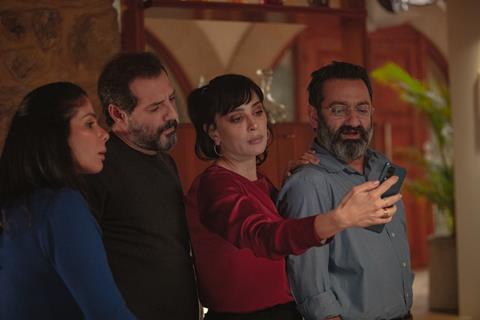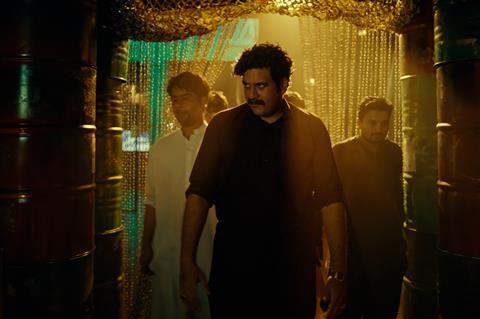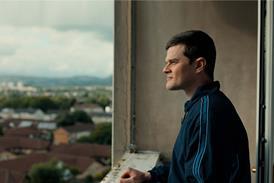
Launched 20 years ago, Front Row Filmed Entertainment has since established itself as one of the leading distributors of independent and genre films in the Middle East and North Africa (MENA) region.
Its 2023 distribution slate includes some of the year’s biggest festival hits, from Palme d’Or winner Anatomy Of A Fall through to Molly Manning Walker’s How To Have Sex and Todd Haynes’ May December.
The Dubai-based company also has several titles playing at Red Sea International Film Festival, among them Hayao Miyazaki’s The Boy And The Heron, Sofia Coppola’s Priscilla and Ali Kalthami’s satirical Saudi drama Mandoob, which world premiered at Toronto.
Front Row recently pushed into production too. Its debut film Perfect Strangers (a remake of 2016 Italian hit Perfetti Sconosciuti) was picked up by Netflix as the streamer’s first Arabic original feature, topping the platform’s most-viewed charts in 2022 in many countries in the region including Morocco, Egypt and Saudi Arabia.
All this is a long way from the early days of Front Row, which was set up by Gianluca Chakra, son of the late Michel Chakra, a veteran film distributor. Raised between Rome and Beirut, Chakra started his career in the business with his father only to move into acquisitions with Lebanon-based competitor Prime Pictures. He then returned to Rome to join MedFilm Festival as a senior programme executive.
Taking a risk
Spotting a gap in the Middle East market, Chakra launched Front Row in Dubai in 2003, funding the company by “selling my car, my CDs and my stereo” and looking for foreign-language films and documentaries to distribute. The first three films he acquired were seminal Brazilian title City Of God, Paul Greengrass’s Northern Ireland-set Bloody Sunday and Lars von Trier’s Dogville. Chakra recalls that he acquired them “literally for nothing” because nobody else in the region “would touch them”. The widespread view among the local industry, Chakra says, was that he was “an idiot” for picking them up.
Not long after, Front Row landed Michael Moore’s Fahrenheit 9/11 — which, nearly 20 years since its release, is still the top-grossing theatrical documentary of all time. Its success helped to bankroll the early days of the company. The firm was also lucky that its early years coincided with the heyday of DVD, when revenues from home entertainment would more than make up for theatrical losses and minimum guarantees for titles.
The launch period, Chakra reflects, was marked by “a lot of geekiness and a lot of being naïve. We didn’t understand the politics of the business here — and there is a lot of politics. We got slapped around a lot. The more we got slapped, the more we learned.”

A key lesson was that, in the MENA market, strategic alliances with other companies are vitally important. “It wasn’t just about the films, it was about not being messed over by competitors,” Chakra explains. “Over here you don’t really have a collaborative environment. It’s more about, ‘Look at this kid, let’s try and kill him before he grows.’
“So, it mattered a lot who you partnered with,” he continues. “The strategic alliances that you form over the years do matter. Then slowly you start realising how to navigate around the system.”
In Kuwait, Front Row is partnered with the Kuwait National Cinema Company (KNCC) and in Saudi Arabia with local exhibitor Muvi Cinemas. Chakra describes the alliances as “pillars” of the company.
Front Row now has 29 staff and acquires between 90 to 120 titles a year for the whole of the Middle East. Chakra says Front Row’s “operational” MENA territories are the Gulf states (Saudi Arabia, United Arab Emirates, Kuwait, Qatar, Bahrain and Oman), parts of the Levant (Lebanon and Jordan) and Egypt. In some MENA countries such as Sudan and Libya, there is “no business to be made at all”, even though they are part of a MENA contract.
Since cinemas started opening in the country in 2018, Saudi Arabia has rapidly become the biggest theatrical market in the Middle East, ahead of UAE and then Kuwait. Still, it is tough for independent international titles to cut through in Saudi cinemas against films from US studios or, increasingly, from Bollywood. A bright spot, however, is Arabic-language content from Saudi and Egypt.

In December 2022, Front Row released Telfaz11-produced Sattar — a Saudi action-comedy about a depressed man becoming a freestyle wrestler — which has since sold 905,000 tickets for a box-office gross of $11.2m. That makes it one of the biggest releases in Saudi Arabia’s box‑office history behind Top Gun: Maverick ($22.6m), Spider-Man: No Way Home ($17.4m) and two Egyptian films, Bahebek ($15.7m) and Waafet Regala ($15.6m).
Arabic-language films now account for 36% of the Saudi box office, Chakra notes. He has high hopes for Mandoob, about a delivery driver in Riyadh who branches out into bootlegging, which was also produced by Telfaz11 and will be released after it plays Red Sea. “We’re definitely going to push it,” he says.
Film buffs
Chakra talks up Saudi filmmaking talent and the tastes of local audiences. Both have been downplayed in the region because they come from a country where cinemas were forbidden for 35 years. “These guys know their cinema… They are real film buffs.” With little in the way of entertainment on offer during the cinema ban, “people would intake all the cinema culture they could [through pirate VHS and DVDs].”
That said, Chakra argues that the novelty of cinemagoing is wearing off somewhat in Saudi. “It’s no longer what it was, where you can release anything and it would work. The first two years were great, but there weren’t enough cinemas — and they mainly focused on major studio releases.” This spotlight on studio films, however, made it tricky at the time for a distributor of international independent films like Front Row to secure screens for its films.
In the early days, Front Row had success in Saudi with films such as The Father and The Green Knight. More recently, Australian horror Talk To Me and religious drama Sound Of Freedom starring Jim Caviezel have done well theatrically for the distributor.

Front Row has also just given a limited theatrical release to Justine Triet’s Anatomy Of A Fall in the region. “It did alright, it wasn’t massive,” Chakra admits. “We know exactly what the market is, it’s a prestige title to have. You’ll have your limited theatrical run and then the real value is eventually on television or VoD. That’s how the film will travel in the Middle East market.”
Coming up is How To Have Sex, whose title one imagines might be problematic in the Middle East. “It’s just the title,” Chakra notes. “We’re debating whether to change it or not. Then depending on the territory, we will release it.” The UAE censor has already passed the film (and has no issue with the title), and it will be released on one arthouse screen in the country. In Saudi, by contrast, it is unlikely to reach cinemas and will be released on a platform or television.
Still, the distribution of arthouse cinema remains a tricky distribution proposition in MENA. The reputation that Front Row has built over the past 20 years for picking up “good films” makes it easier to find a home for them, Chakra says, adding that the company consciously sought to build its brand among consumers and the industry from the very beginning.
The company has, however, had particular success in creating premium windows for VoD releases in the MENA region. It has aggregation agreements with iTunes and Google Play, with Chakra describing Front Row as the sole indie film aggregators in the region. These deals helped open the doors to Front Row working with Netflix too, with the streamer subsequently picking up its production of Perfect Strangers.
Production push
The next film from Front Row’s production arm is Matty Brown’s atmospheric thriller The Sand Castle, which filmed in Beirut and reunites Nadine Labaki with Zain Al Rafeea, the Syrian refugee who appeared alongside her in 2018 Cannes jury prize winner Capernaum. It is set for release early next year.
Chakra calls the push into production an “addition” to Front Row’s business rather than a shift in direction. It comes as many of the global and regional streaming platforms invest in local production to attract local subscribers. “If you want to be relevant and continue excelling at what you do, you really have to get into production,” Chakra says. “It is happening worldwide — many distributors are now moving into production.”
He hopes to shoot two films next year: a “Gomorrah-type” feature about a queen-pin in Jordan, based on a true story, and an Arabic-language remake of Intouchables that will film in Egypt.
Front Row acquired the rights to Olivier Nakache and Eric Toledano’s French hit three years ago but has struggled to cast one of the leads, as many local actors do not want to be seen in a wheelchair. “It is still a taboo,” says Chakra, who adds that — after all this time — he is still learning about the huge cultural differences that exist in the MENA region.
And then, of course, there is the Israel-Hamas war. “People are scared,” Chakra says, noting that many in the region are fearful the conflict could expand out of Gaza. At the American Film Market, he noted that many distributors were scaling back on acquisitions. “People were much more cautious. You just don’t know what will happen. People learned a lot from Covid.”















![[Clockwise from top left]: Paul Thomas Anderson, Chloe Zhao, Ryan Coogler, Park Chan-wook](https://d1nslcd7m2225b.cloudfront.net/Pictures/274x183/9/0/0/1467900_writerdirectors_192733.jpg)





![[Clockwise from top left]: Paul Thomas Anderson, Chloe Zhao, Ryan Coogler, Park Chan-wook](https://d1nslcd7m2225b.cloudfront.net/Pictures/100x67/9/0/0/1467900_writerdirectors_192733.jpg)


No comments yet